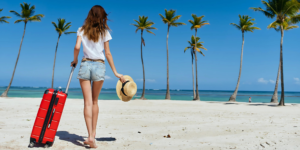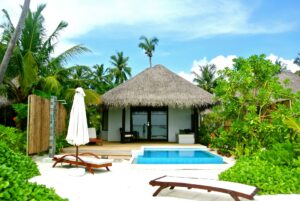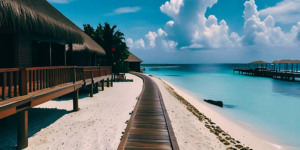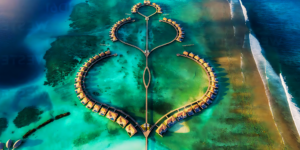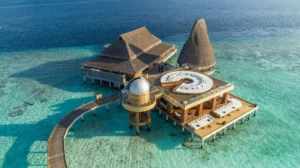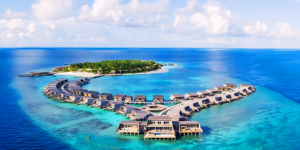What It’s Really Like to Live in the Maldives
The Maldives is often portrayed as the ultimate luxury vacation destination, with stunning overwater villas, turquoise lagoons, and white sandy beaches. However, what’s it really like to live in this tropical paradise? Beyond the dreamy resorts and luxury lifestyle, the Maldives has a rich culture, unique challenges, and a way of life that may surprise you. Let’s take a closer look at daily life in this idyllic island nation.
1. Living on an Island
First and foremost, the Maldives is made up of over 1,000 islands, with about 200 being inhabited. Living on an island means that life is inherently different from mainland living. Most residents live in the capital, Malé, or on one of the larger atolls. The pace of life is slower, with a focus on community and family. Islanders often enjoy spending time together, whether it’s relaxing by the beach or gathering for traditional Maldivian meals.
Recommended Hotel: Amilla Fushi Resort & Residences
Amilla Fushi offers a unique island experience. This luxury resort combines modern living with a traditional Maldivian setting. The resort has villas built within lush forests or directly over the crystal-clear lagoon, giving you a glimpse into the island lifestyle.
2. The Importance of Community
In the Maldives, the community is everything. Islanders rely on one another, and there’s a strong sense of unity. Daily life revolves around family, friends, and religious practices. Islam is the official religion, and the majority of Maldivians practice it. You’ll hear the call to prayer five times a day, and most social gatherings happen around the mosque or local food markets.
Recommended Hotel: Kuramathi Island Resort
Kuramathi offers a close-knit island experience. With its vast coral reefs and charming villages, it provides guests with an authentic look at life in the Maldives. The resort promotes local culture through traditional performances and cuisine, so visitors can better understand the Maldivian way of life.
3. The Challenges of Island Living
Living in paradise comes with its own challenges. For instance, goods and supplies need to be imported, which can make everyday items more expensive and occasionally difficult to find. Access to healthcare and education is limited on smaller islands, often requiring travel to the capital or larger cities. Despite these challenges, the Maldivian people are resourceful and have learned to adapt to their unique environment.
Recommended Hotel: Sun Siyam Iru Fushi
Sun Siyam Iru Fushi embraces sustainable living in the Maldives. This resort emphasizes environmental awareness and conservation, addressing the challenges of island life. Staying here allows visitors to see how the local population copes with limited resources while promoting eco-friendly practices.
4. A Strong Connection to the Ocean
Living in the Maldives means living closely with the ocean. The sea is central to the lives of Maldivians, who rely on fishing for food and income. From a young age, locals are taught to swim, fish, and navigate the waters. Fishing is the traditional occupation, but tourism has grown significantly in recent years, becoming a primary source of income for many islanders.
Recommended Hotel: Milaidhoo Island Maldives
Milaidhoo is a boutique resort that celebrates the close relationship between Maldivians and the sea. The resort offers ocean-themed experiences, such as guided snorkeling and fishing trips, where guests can learn about traditional Maldivian fishing techniques and marine conservation.
5. The Blend of Tradition and Modernity
The Maldives has seen rapid modernization in the past few decades, especially due to the booming tourism industry. While modernity is evident in resorts, restaurants, and hotels, many Maldivians still embrace their traditional customs. Life on the islands is a delicate balance between preserving cultural heritage and embracing technological advancements.
Recommended Hotel: Hideaway Beach Resort & Spa
Hideaway Beach Resort & Spa combines luxury with traditional Maldivian hospitality. The resort features private villas, blending the old with the new, and offers cultural tours that give guests a deeper understanding of island life.
6. Environmental Concerns
Climate change is a real threat to the Maldives, as rising sea levels pose a significant risk to the low-lying islands. Maldivians are acutely aware of this issue and are actively involved in conservation efforts. Many resorts have adopted eco-friendly practices, and there is a growing movement to preserve the delicate ecosystem.
Recommended Hotel: Reethi Faru Resort
Reethi Faru is dedicated to sustainability, with coral restoration projects and a zero-waste policy. Guests staying at this resort can participate in environmental programs and see firsthand how locals are working to protect their islands from climate change.
Final Thoughts
Living in the Maldives may seem like a dream, but it’s a life deeply connected to the ocean, community, and culture. It’s a slower, more intentional way of life, with challenges that come from being isolated on small islands. However, the beauty, culture, and sense of belonging that come with island life make the Maldives truly special.


